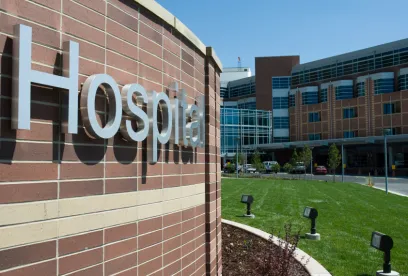On March 27, 2020, Congress responded to the COVID-19 emergency by adopting the Coronavirus Aid, Relief, and Economic Security Act (the CARES Act), the most massive economic recovery legislation in United States history. A key focus of the CARES Act is the adoption of a variety of measures designed to expedite the approval and availability of drugs and devices needed to fight the pandemic, to shore up the financial positions of hospitals and other healthcare providers facing unprecedented demands, and to temporarily relax restrictions that may make it more difficult for patients to obtain access to needed testing and care. These measures include provisions that enhance access to telehealth services; provide expanded coverage for COVID-19-related services from Medicare, Medicaid, and private insurance and managed care organizations; expedite review and approval of new potential treatments; defer certain scheduled Medicare cuts and provide add-on payments to hospitals for treatment of COVID-19 patients; and expand the authority of non-physician practitioners in some circumstances.
Many of these new measures are specifically limited to the duration of the COVID-19 public health emergency. However, a number of them also reflect reforms that providers, drug and device manufacturers, and other industry participants have sought for some time, and it will be interesting to see whether experience with those reforms during the crisis leads to permanent changes in the healthcare system.
The following is a summary of the major healthcare provisions of the CARES Act.
Changes in Governmental Oversight and Private Industry Reporting of Medical Product Supplies
The CARES Act addresses structural shortcomings that are viewed as contributing to shortages being experienced by healthcare providers attempting to procure medical products, emergency drugs, and COVID-19 laboratory tests.
-
It directs the Department of Health and Human Services (HHS) and the National Academies of Sciences, Engineering, and Medicine to examine and report on the security of the US medical product supply chain, including an evaluation of the country’s dependence on critical drugs and medical devices from foreign sources as well as recommendations to improve the resiliency of the US supply chain.
-
It requires that the Strategic National Stockpile of medical supplies include certain types of medical supplies and equipment, including personal protective equipment and other equipment and supplies needed for COVID-19 testing and treatment.
-
To incentivize additional production and distribution of personal respiratory protective devices, such as masks and respirators, the CARES Act provides manufacturers of such devices permanent immunity from suit and liability under federal and state law with respect to any use of such devices during the COVID-19 public health emergency that is related to COVID-19 testing or treatment.
-
It requires the Food and Drug Administration (FDA) to prioritize and expedite the review of drug applications and inspections to prevent or mitigate a drug shortage.
-
It requires pharmaceutical and medical device manufacturers to: (i) disclose any discontinuation or interruption in the manufacturing of emergency drugs and essential medical devices (or any ingredients of a drug or components of a device), (ii) provide information about the volume of such drugs and devices, and (iii) maintain redundancy risk management plans to mitigate shortages.
-
It requires HHS to prepare and submit to the FDA and the Centers for Medicare & Medicaid Services an annual report listing the current drug shortages, and to prepare and maintain an up-to-date list of medical device shortages.
Enhanced Insurance Coverage
The CARES Act provides COVID-19 patients greater insurance coverage.
-
It expands the insurance coverage for COVID-19 testing beyond what was required in the Families First Coronavirus Response Act (the Families First Act) (enacted March 18, 2020) by requiring coverage not only for FDA-approved COVID-19 testing, but also for COVID-19 testing (i) that is pending FDA approval, (ii) for which the developer intends to apply for FDA approval within a reasonable time frame, or (iii) that is otherwise approved by HHS. This insurance coverage applies to private insurance plans and must be without any cost-sharing (including deductibles, copayments, or coinsurance) or other barriers (prior authorization or other medical management requirements). The CARES Act also requires insurance coverage of certain services and vaccines intended to prevent or mitigate COVID-19.
-
It clarifies sections of the Families First Act by ensuring that (i) Medicare beneficiaries can receive COVID-19 testing in Medicare Part B at no cost and (ii) uninsured individuals can receive COVID-19 testing and related services at no cost under any state Medicaid program that elects to offer such enrollment option.
-
It requires each provider of a diagnostic test for COVID-19 to disclose the cash price for such test on the provider’s website; providers who fail to do so are subject to civil monetary penalties.
-
It requires that Medicare prescription drug plans and Medicare Advantage Part D plans allow up to a 90-day supply of prescription drugs during the COVID-19 emergency period.
-
It permits a high-deductible health plan with a health savings account to cover telehealth services prior to a patient’s reaching the deductible.
Financial Support to Healthcare Providers
The CARES Act provides financial support for healthcare providers and increased flexibility in reimbursement for certain services to Medicare and Medicaid beneficiaries.
-
It provides $1.32 billion for HHS to provide supplemental awards for fiscal year 2020 under the Public Health Service Act (PHSA) to community health centers for the detection, prevention, diagnosis, and treatment of COVID-19.
-
For each of the fiscal years 2021 through 2025, it provides $29 million in grant programs for telehealth networks and telehealth resource centers, and $79.5 million in grant programs for rural healthcare services outreach, rural health network development, and small healthcare providers.
-
It establishes a “Ready Reserve Corps” of healthcare professionals to be available for service during the COVID-19 public health emergency, with authority for compensation and benefits.
-
It limits the liability of volunteer healthcare professionals under federal and state law during the COVID-19 emergency response, in effect creating a federal “Good Samaritan Law” applicable to the COVID-19 crisis.
-
It authorizes HHS to reassign members of the National Health Service Corps to sites close to the ones to which the members were originally assigned, in order to provide volunteer health services, as needed, during the COVID-19 public health emergency.
-
It provides conforming changes to align the provisions of the PHSA governing the confidentiality and disclosure of records relating to substance abuse disorders with the initial patient consent provisions of the Health Insurance Portability and Accountability Act (HIPAA).
-
It permits HHS to approve the transfer of funds received by a state agency or an area agency on aging under the Older Americans Act (OAA) meal programs to such use as the agency considers appropriate to address the COVID-19 public health emergency in its area. It also waives the dietary guidelines requirements under the OAA to permit the delivery of meals to individuals practicing social distancing due to the COVID-19 public health emergency.
-
It gives the Department of Labor flexibility to extend the services and opportunities for participants in community service activities under the Senior Community Service Employment Program in Title V of the OAA as a result of the COVID-19 public health emergency.
-
It requires HHS to issue guidance, within 180 days after the effective date of the CARES Act, on the sharing of COVID-19 patients’ protected health information in compliance with HIPAA and related regulations during the COVID-19 public health emergency.
-
It reauthorizes and appropriates $125.5 million for fiscal years 2020 through 2025 for the Healthy Start program, aimed at reducing the rate of infant mortality and improving perinatal and infant health outcomes.
-
It directs HHS to carry out a national campaign to improve awareness of the importance and safety of blood donations to meet blood supply needs during the COVID-19 public health emergency.
-
It delays the 2% Medicare sequester through December 31, 2020, and extends the direct spending reduction on the back end from 2029 to 2030.
-
It provides for a 20% add-on payment to hospitals for treatment of inpatient COVID-19 cases, which is available through the duration of the COVID-19 emergency period.
-
It waives certain requirements applicable to post-acute care providers to allow hospitals flexibility, during the COVID-19 public health emergency, to transfer patients out of their facilities and into alternative care settings in order to prioritize resources needed to treat COVID-19 cases.
-
It expands an existing Medicare accelerated payment program to allow qualified hospitals to obtain, as a lump sum or in periodic payments, up to six months of advanced Medicare payments (based on prior-period experience) as a loan to stabilize cash flow. Hospitals receiving such advances would not have to begin repayment for four months, and would have up to 12 months to complete repayment before any interest would apply to the advances.
-
It delays scheduled reductions in Medicare durable medical equipment payments for the duration of the COVID-19 public health emergency, as well as prevents scheduled reductions in Medicare payments to clinical laboratories in 2021. It also delays by one year the upcoming reporting period during which clinical laboratories are required to report private payer data.
-
It allows state Medicaid programs to pay for direct support professionals — i.e., caregivers trained to help with activities of daily living — to assist disabled individuals in the hospital to reduce length of stays and free up beds.
-
It adopts several initiatives to expand the provision of telehealth services to Medicare patients during the COVID-19 public health emergency, including: (i) eliminating the limitation included in the Coronavirus Preparedness and Response Supplemental Appropriations Act of 2020 that provided reimbursement for telehealth services to Medicare patients only if the healthcare professional had treated the patient within the last three years, (ii) permitting federally qualified health centers and rural health clinics to furnish telehealth services to Medicare patients in their homes, (iii) temporarily waiving the face-to-face requirements for home dialysis patients and hospice recertifications, and (iv) encouraging the use of telehealth to furnish home health services.
-
It reauthorizes Health Resources and Services Administration programs that promote the use of telehealth technologies for healthcare delivery, healthcare education, and health information services.
-
It allows physician assistants, nurse practitioners, and other non-physician practitioners to order home health services for Medicare beneficiaries.
-
It provides extensions of funding for various Medicare programs, Medicaid programs, and other public health programs (such as community health centers, the National Health Service Corps, and diabetes programs).
-
It reforms the regulatory process for over-the-counter (OTC) drug monographs by allowing the FDA to approve changes to OTC drugs through an expedited administrative process and clarifies that an OTC drug that does not comply with the monograph requirements is misbranded.
Innovation for Public Health Emergencies
The CARES Act seeks to improve innovation to respond not only to the coronavirus but also to other potential public health emergencies.
-
It amends the PHSA to remove the cap on “other transaction authority” (OTA) during a public health emergency, which will allow the Biomedical Advanced Research and Development Authority to contract with the private sector on research and development on a more competitive basis.
-
It expedites the approval process for any new drug with the potential to prevent or treat the coronavirus (or any similar, future virus) by amending the Federal Food, Drug, and Cosmetic Act to provide priority designation and expedited development, review, and approval of any new animal drug that has the potential to prevent or treat a zoonotic disease in animals that could cause a serious disease in humans.
Improvements to the Healthcare Workforce
The CARES Act seeks to improve the training of the healthcare workforce.
-
It authorizes more than $23 million in grants for each fiscal year from 2021 through 2025 for designated health professional schools for the purpose of assisting and supporting health professions education.
-
It reauthorizes funds for healthcare workforce training under the PHSA, including appropriating for each of fiscal years 2021 through 2025 the following: ◦More than $67 million for health professions training for disadvantaged students
-
More than $48 million for primary care training and enhancement (with priority to qualified applicants that train primary care residents in rural areas, including tribes or tribal organizations)
-
More than $28 million for training in general, pediatric, and public health dentistry
-
More than $41 million for area health education center programs
-
More than $5.6 million for the National Center for Health Workforce Analysis, which provides for the development of information relating to the healthcare workforce
-
More than $17 million for training of individuals in the public health workforce
-
Additional sums as may be necessary for the training of pediatric medical and surgical specialists
-
More than $40 million for training relating to geriatrics
-
-
It reauthorizes funds for the development of the nursing workforce under the PHSA, including appropriating for each of fiscal years 2021 through 2025:
-
More than $137 million for (i) hiring and training nurse practitioners, nurse mid-wives, nurse anesthetists, and other advanced education nurses; (ii) increasing nursing workforce diversity; and (iii) strengthening the capacity for basic nurse education and practice
-
More than $117 million for the operation of a student loan fund with any public or nonprofit private school of nursing
-
-
Finally, it directs HHS, in consultation with the Advisory Committee on Training in Primary Care Medicine and Dentistry and the Advisory Council on Graduate Medical Education, to develop a comprehensive and coordinated plan with respect to HHS’s healthcare workforce development programs, including performance measures and identification of gaps in projected workforce.




 />i
/>i

